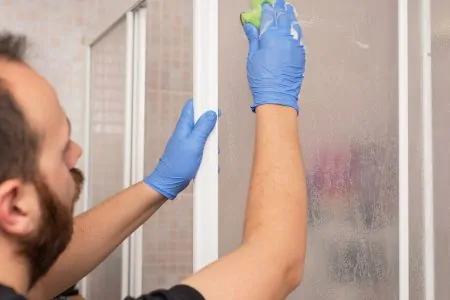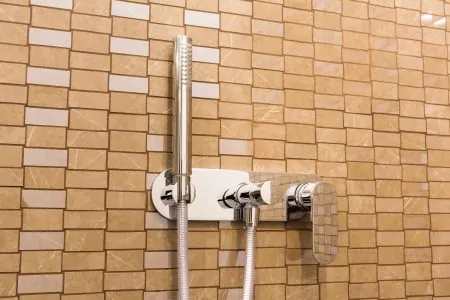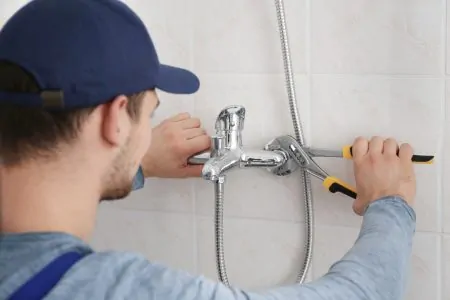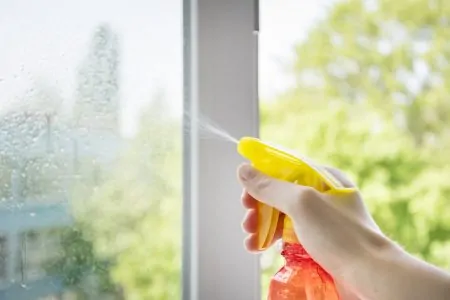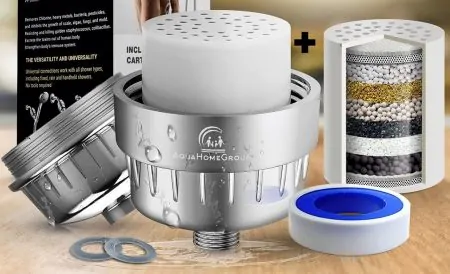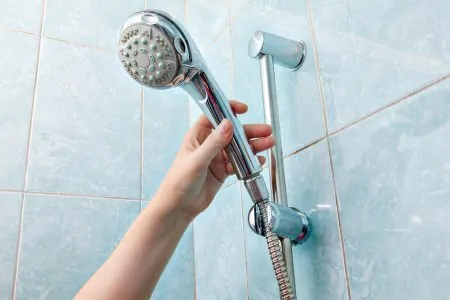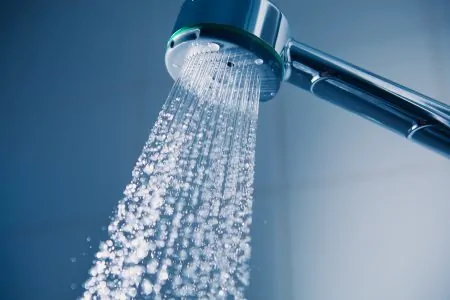Shower doors are constantly exposed to dirty and soapy water, which is why they are one of the first parts of any home to get dirty. Thankfully, cleaning them is a very straightforward task when you know how to.
Modern shower doors are designed to encourage water to flow off their surface quickly, reducing the appearance of dirt. Even so, you will still need to clean it sooner or later if you want to keep it looking as good as new.
In this article, we will explore six different methods for cleaning these important bathroom surfaces, most of which use everyday household products. Knowing how to clean shower doors will help keep your bathroom looking beautiful.
Key Takeaways
- Use vinegar and baking soda: Mix white vinegar and baking soda to create a paste, apply to shower doors, wait 10-15 minutes, and wipe off with a wet sponge.
- Use lemon: Rub lemon halves on shower doors, let sit for 15-30 minutes, and scrub with a sponge before rinsing and drying.
- Utilize a steam cleaner: Prepare your steam cleaner, steam your shower doors from top to bottom, and dry with a clean cloth.
- Maintain cleanliness: Wipe down shower doors with a squeegee or dry cloth after each use to prevent dirt and scum buildup.
- Shower Doors with Protective Coating
- How to Clean Shower Doors with Ammonia
- How to Clean Shower Doors with a Magic Eraser
- How to Clean Shower Doors with Dryer Sheets
- How to Clean Shower Doors with Baking Soda and Vinegar
- How to Clean Shower Doors with Lemon
- How to Clean Shower Doors with Steam
- FAQs
- Admire Your Spotless Doors
Important
Shower Doors with Protective Coating
Many modern shower doors have a protective coating. This finish provides a smoother surface, which encourages water to flow away quickly, reducing the appearance of dirt and mineral deposits. They also make it easier to wipe the surface clean.
If your shower doors have a protective coating, you will need to clean them according to the manufacturer’s guidelines.
These sealants can be damaged if they aren’t treated with care. Acidic, abrasive, or alkaline cleaning products can remove the finish, exposing the glass to damage and increasing its water and dirt retention. (1).
How to Clean Shower Doors with Ammonia
If ammonia is your chemical cleaner of choice, you can use it to clean your shower doors, as long as the manufacturer doesn’t warn against it.
1. Safety First
Make sure the bathroom is properly ventilated, including opening the door and windows if you have them. Inhaling ammonia fumes could make you very ill, so wear a protective mask and rubber gloves (2).
2. Prepare Ammonia Solution
Mix approximately one gallon of water with one cup of ammonia in a bucket.
3. Transfer Solution
Use a funnel to fill a clean spray bottle with your ammonia solution. Make sure the top of the bottle is secured tightly, so it doesn’t leak.
4. Apply to Shower Doors
Spray the homemade ammonia solution liberally over the interior of your shower doors. If necessary, also spray the exterior but be careful not to hit any nearby items (particularly your toothbrush).
5. Scrub Away
Using a soft-bristled, scratch-free scrub brush or sponge, scrub your doors. Continue until there are no more visible stains and scum.
6. Rinse Thoroughly
Rinse the doors with clean water, wiping with the soft side of your sponge to speed up the process. Don’t stop until no traces of ammonia remain.
7. Dry and Polish
Use a clean rag or microfiber cloth to dry your shower doors. Apply a glass or shower cleaner to give it some extra shine if you want.
How to Clean Shower Doors with a Magic Eraser
Magic erasers are very useful tools for treating stubborn hard water stains. Most of these products are made of melamine foam, which has abrasive qualities. (3)
Read The Label
1. Protect Your Hands
Magic erasers are safe to use unprotected for quick jobs such as wiping fingerprints off of white doors or light switches.
For prolonged tasks, it is best to wear gloves. The sponge can irritate your skin if rubbed against it repeatedly (4).
2. Get to Work
Wet your magic eraser or sponge. Then, rub it over your doors and watch as dirt and mineral deposits break down and disappear.
3. Rinse and Dry
Rinse your doors with clean water and dry them with a cloth or a clean towel. Spray the surface with a glass cleaner or polish to improve its shine.
How to Clean Shower Doors with Dryer Sheets
You might have heard about various cleaning hacks using dryer sheets. If you have a pack, they can make a significant difference to how clean your shower doors are.
1. Wet Shower Doors
Rinse your shower doors to wet the surface.
2. Gloves On, and Doors and Windows Open
Put your gloves on — handling dryer sheets for prolonged periods can irritate the skin. If you have any breathing difficulties, keep the bathroom well-ventilated while you work. The strong fragrance of the sheets could cause issues in an enclosed space (5).
3. Scrub Doors with Sheets
Pull out a dryer sheet and rub your shower doors with it from top to bottom. Any scum and gunk should be dislodged easily.
When the sheet becomes too dirty, dispose of it and grab a new one until the job is done.
4. Rinse, Dry and Polish
Rinse your doors to remove any residual grime. Dry them with a clean cloth and then polish them with a glass cleaner for a finishing touch.
How to Clean Shower Doors with Baking Soda and Vinegar
While there are many chemical cleaners available, some of the most effective cleaning methods involve using products that could already be in your kitchen. White vinegar and baking soda form one of the most reliable combinations in home cleaning and can be used for a variety of purposes.
Baking soda is mildly alkaline and abrasive, which allows it to remove dirt effectively (6). Acidic vinegar is its perfect partner, killing certain bacteria, germs, and mold (7).
Warning
1. Prepare the Mixture
Mix white vinegar and baking soda in a mid-sized bowl to create a paste. The easiest way to do this is by adding small amounts of vinegar to the baking soda until it forms a paste, as this will prevent it from becoming too thin.
2. Coat Your Doors
Use a sponge to apply the paste to your shower doors. Aim for even coverage.
3. Let It Work
Leave the paste on your doors for 10 to 15 minutes to give it time to work.
4. Clean Paste Off
Wipe the solution off your doors using a wet sponge. You can also rinse the doors with your shower to speed things up.
5. Squeegee Doors
If you have a squeegee, use it on your doors to remove any lingering baking soda or vinegar.
6. Dry Doors and Finish Up
Dry your shower doors with a soft, clean cloth. You can achieve a better finish by applying a glass cleaner or water-repellant agent.
How to Clean Shower Doors with Lemon
You’ve probably heard the term “lemony fresh” at least once in your life. The refreshing, distinctive smell of lemon has long been closely linked with cleaning.
While there are numerous lemon-scented chemical cleaners, it is also possible to clean using actual lemons. This has the added benefit of being completely natural for people who try to avoid using chemicals.
This is a great way of getting rid of lemons that you don’t need, but we don’t recommend buying lemons purely for cleaning. Lemons aren’t as cheap as they once were, which can make this a relatively expensive method (9).
However, it is ideal if you have lemons that will otherwise be wasted. For example, you might have a lemon tree in your garden or have bought a large pack of lemons.
Lemons can be applied to shower doors in two different ways:
- Directly onto the surface
- Squeezed to create a solution
The Direct Method: Lemons Only
- Remove seeds: Cut your lemons in half and remove the seeds. Otherwise, the seeds will end up in your shower enclosure or down the drain.
- Apply the juice: Rub a lemon half against your doors.
- Wait: Once you have covered the surface, leave the juice for 15 minutes to half an hour to give it time to work.
- Repeat: If the juice dries out completely before the end of this period, apply more.
- Scrub: Once enough time has passed, rub your doors with a standard sponge.
- Rinse and dry: Rinse off the lemon juice and dry the surface, polishing it if you like.
The Indirect Method: Use a Spray Bottle
If you don’t want to get messy, this method is far more user-friendly:
- Juice: Squeeze a few lemons into a clean spray bottle.
- Apply: Coat your doors with lemon juice spray.
- Wait: Leave it to work for 15 to 30 minutes.
- Repeat: Reapply the spray whenever you notice the juice drying out.
- Scrub: Once enough time has passed, rub your doors with a sponge.
- Rinse and dry: Rinse the juice off, then dry your shower doors thoroughly. If you like, polish them for an improved shine, and you’re done.
How to Clean Shower Doors with Steam
If you have a steam cleaner, you can use it to clean shower doors very effectively. For very dirty shower doors, it could also be worth renting one. The super-heated steam will do most of the work for you.
1. Prepare Steam Cleaner
Prepare your steam cleaner for the task ahead. Follow the manufacturer’s instructions but this will usually be as simple as filling the water tank, turning on the power, and letting the water heat up.
2. Accessorize
Keep the cleaner’s accessories nearby so you can switch between them. For example, you can begin with a soft-bristled scrub brush for the heavy dirt deposits and switch to a squeegee to wipe the glass down at the end.
3. Steam Top to Bottom
Run your chosen attachment over your doors, working from top to bottom. This means you won’t make clean areas dirty again with run-off while cleaning higher up.
4. Dry Doors
Use a clean cloth to wipe your doors down and dry them. Apply any extra products you want to use, such as a glass cleaner or temporary sealant for a glossy finish.
FAQs
Admire Your Spotless Doors
If it has been a while since you last cleaned your shower doors, you might be surprised by how big a difference even a quick clean can make. Modern shower glass is designed to be easy to wipe clean, so the easiest way to avoid dirt and scum is to prevent it from building up in the first place.
Getting into the habit of removing leftover water after showering will keep your enclosure cleaner for longer. This can be as simple as giving it a quick rub with a dry cloth or wiping it down with a squeegee. Doing this will prevent much of the dirt and scum that shower water leaves behind when it dries.
